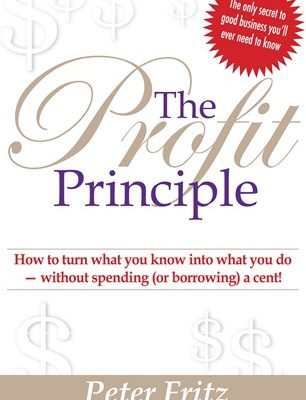Managed Accidents

Along with my colleague Jeanne-Vida Douglas, I have just finished writing a new book titled “The Profit Principle”.
The book is due for release in November but the whole hook of it, which I wanted to share here, is that the most common mistake people make in business is falling for the adage that you have to “spend money to make money”.
That’s simply not true; you need to invoice to make money!
 Writing the book has been great fun, largely because the process has been an opportunity to reconnect with old colleagues to reminisce on how it worked out that we built businesses together, from scratch, into successful companies.
Writing the book has been great fun, largely because the process has been an opportunity to reconnect with old colleagues to reminisce on how it worked out that we built businesses together, from scratch, into successful companies.
Sometimes good advice is difficult to give away, and I hope that packaged up in a hardcover my younger colleagues will find my thoughts helpful.
First 5000 was initiated for much the same reason, to assist Australia’s leading SMEs tap into the profit principle.
People talk about business principles all the time. They talk about maximising opportunities, about the importance of networking, they talk about good management, innovation, leadership and so on.
In my life, the turning points have been a series of managed accidents which have resulted in small, medium and large sized rewards. Over time I’ve got better at managing to have more of those accidents.
How does this apply to the First 5000?
Well, if you have been invited to be a part of First 5000 then you are part of a club that is a very special group of companies, with very special characteristics, all of which can be summed up in one word – “successful”. Such special companies must be masters of managed accidents. It is by converting chance meetings into relationships, then extending those relationships into areas which in the first instance were not on the agenda that opportunities occur.
First 5000 is an incubator for serendipity.
It is impossible to know where new relationships will lead, but if you don’t actively seek them out and develop them then they will definitely lead nowhere.
I first met David Lance at a University of Technology Sydney (UTS) alumni event in 1985. David was then the Deputy Chancellor at UTS but he also was a share-broker. We chatted at this function and got along well, we bumped into each other at a couple of subsequent functions and kept chatting.
In 1988 I engaged him in a conversation about the possibility of floating a couple of our companies on the Australian Stock Exchange. The upshot of that conversation was that it wasn’t a good time; interest rates were running high, everyone needed money, the economy was wretched.
A couple of years later we met again. This time David had a couple of thoughts about a business idea for me which went nowhere.
Then in 1991 we had coffee for no particular reason other than a friendly catch up. Over this coffee the conversation returned again to the possibility of floating some of the companies. David said he would look into it and a short while later called me back saying he’d found an underwriter to have a look at the proposition.
As a result, eventually, in 1993 Techcomm Ltd was born, which went on to become UXC – the largest service company on the Australian Stock Exchange. UXC now employs thousands of people and has grown so successful that it has forgotten its origins. But that no longer matters. UXC is successful company, a great place to work, an enthusiastic, growing organism.
What First 5000 provides is an opportunity to you the members to meet one another (without having to eat function catering) and start building new relationships with your peers. It is fertile ground in which to create your own managed accidents that can lead to successful ventures.
Whether they will remain small or grow large is up to the individuals involved.
Peter Fritz AM is Managing Director Global Access Partners, and Group Managing Director of TCG – a diverse group of companies which over the last 38 years has produced many breakthrough discoveries in computer and communication technologies. He chairs a number of influential government and private enterprise boards and is active in the international arena, including having represented Australia on the OECD Small and Medium Size Enterprise Committee. Global Access Partners established the First 5000 community in 2010.
Peter Fritz AM is Managing Director of Global Access Partners, and Group Managing Director of TCG – a diverse group of companies which over the last 38 years has produced many breakthrough discoveries in computer and communication technologies. He chairs a number of influential government and private enterprise boards and is active in the international arena, including having represented Australia on the OECD Small and Medium Size Enterprise Committee.



